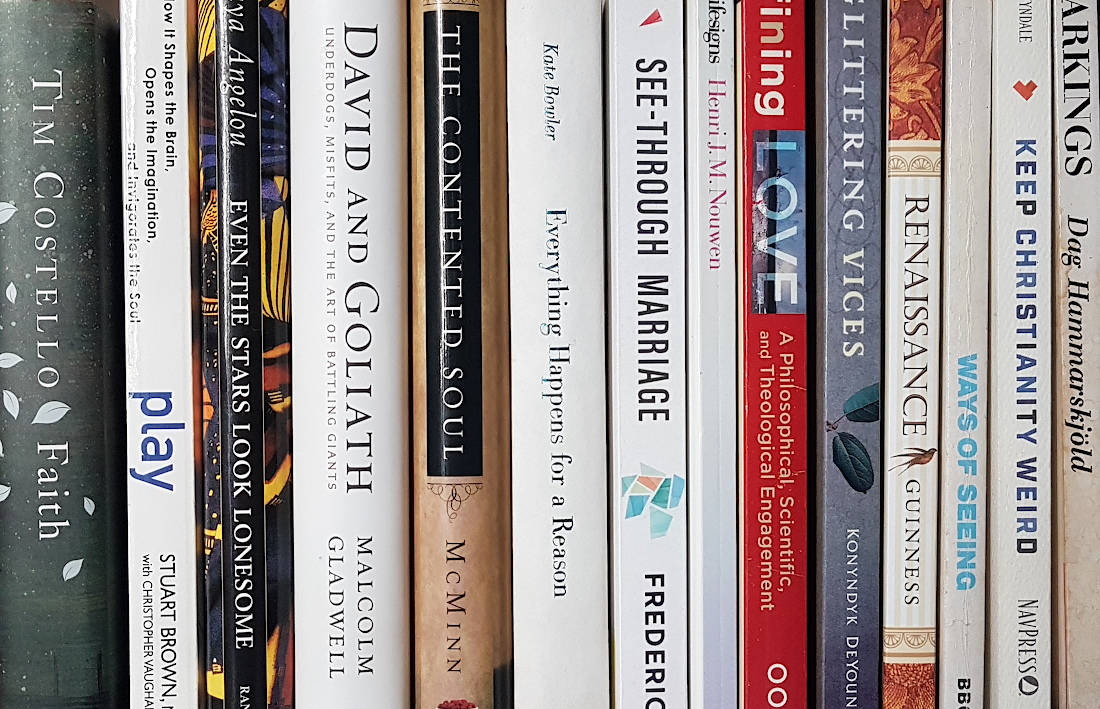
The Best Books I Read in 2020
In what has become a fun annual tradition, here is my year in reading – all the fiction, non-fiction, memoir, poetry, theology and other titles I read with short reflections on each. Some of these books happen to have been released this year too, but many are older. I used to publish this list around the turn of the new year but got pushback from people wanting to use it for Christmas gifts, so here it is with a few weeks still left on the clock. Amazon links are provided for more information, but do consider supporting your local bricks-and-mortar store too.
What was your best read of the year? I’d love to know in the comments. And if you want more literary inspiration, you’ll find previous year’s lists here. Enjoy!
Particularly Recommended
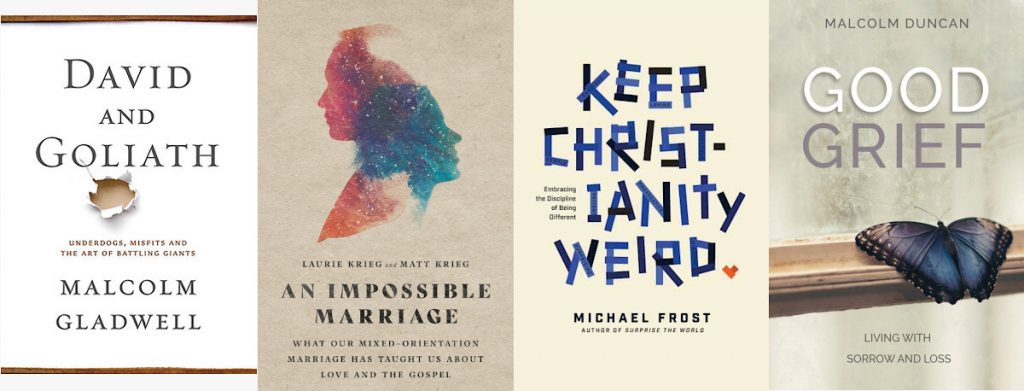
David and Goliath by Malcolm Gladwell
Ever-intelligent Gladwell marshals a raft of well-researched cases involving discrimination, disability, lower-tier schools and more to suggest that those who face obstacles and disadvantages can, under certain conditions, be the real winners. Brilliant.
An Impossible Marriage by Laurie Krieg and Matt Krieg
This is a powerful, vulnerable exploration of a mixed-orientation marriage, and how this couple has wrestled sexual trauma, addictions, avoidance, and more to pursue their convictions of fidelity. Through it all they’ve made some discoveries about love, desire, intimacy and commitment that will benefit anyone. A unique – and uniquely needed – book.
Keep Christianity Weird by Michael Frost
Starting with Richard Beck’s idea that Christianity should be the ultimate ‘eccentric’ (off-centre) faith because it places Christ rather than the self at the centre, then using the Weird Cities movement as symbolic of the world’s desire for something beyond the norm, Frost calls Christians back to living radically different lives from the world. I’m not sure he ever uses the word but this is a book about full-orbed holiness. An inspiring and rightfully challenging book.
Good Grief by Malcolm Duncan
I rarely include a title I’ve endorsed in this section because if I’ve endorsed it, I already recommend it. But this is such a good book I felt I’d be doing an injustice leaving it out. My endorsement below will tell you why.
Books I Endorsed
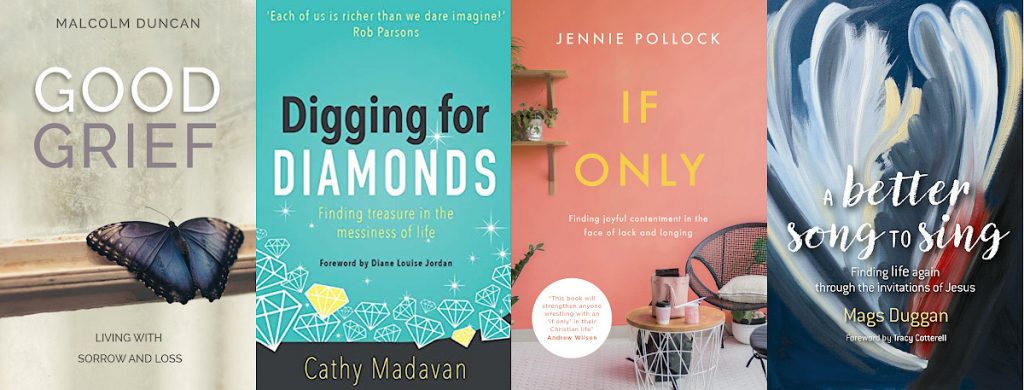
Good Grief by Malcolm Duncan
“In the space of a few years Malcolm Duncan faced more grief than most of us will in a lifetime. Each loss drove him to his prayer stool and his Bible, pounding them with his tears in search of answers. The result is Good Grief, a book of such vulnerability, sensitivity, poetry and insight that it may well prove the best work on the subject we’ll see for sometime. Pastors will preach from it, counsellors will reference it, and those in deep sadness will find in it deep solace. Malcolm has cut his way through the thickets, with the scars to prove it, and can now offer us guidance on making our own way home.”
Digging for Diamonds 40 Day Devotional
“‘Value is not the same as price.’ ‘The jewel in God’s creative crown is mankind.’ ‘Just as coal and diamonds are both forms of carbon, we can see messy or we can see precious potential in the same place.’ Full of thought-gems like these, this a warm-hearted collection of biblical reflections and prayer prompts. Let Cathy be your devotional companion for the next 40 days, bringing God into each moment.”
If Only by Jennie Pollock
“If God is an ocean, we have barely dipped our feet at the shore. In If Only, Jennie asks us to examine the things we believe will bring us contentment and ask if we’re not actually grasping for God himself. Come deeper into the water, she says, and see if he isn’t the ultimate source of contentment we need.”
A Better Song to Sing by Mags Duggan
“Now here’s a provocative idea. Could the spiritual malaise we often feel – the frustration, disappointment, even boredom about our spiritual life – be signs of God’s Spirit yearning within us, wanting more for us than we’re living? Mags Duggan thinks so. Coming to us as both spiritual director and fellow pilgrim, wise from her wounds and sensitive to our longings, she draws us into six invitations from Jesus to find deeper grace and joy. I thoroughly recommend it.”
General Non-Fiction
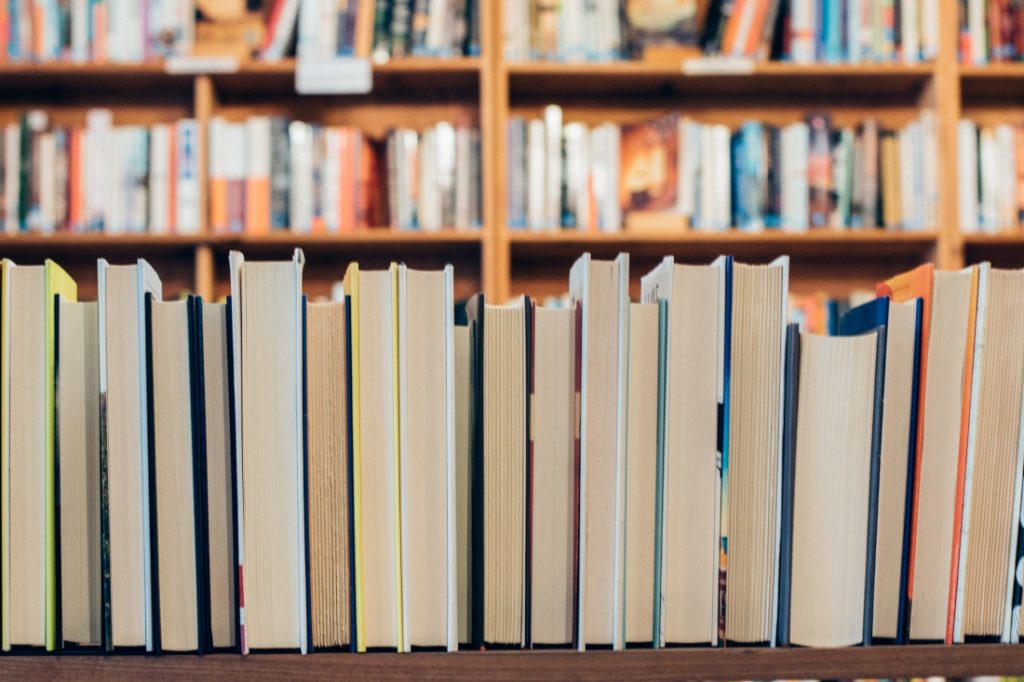
Play by Stuart Brown
Brown, founder of the National Institute for Play, rolls out a scientific rationale for why we play and why it does us so good. While like many social scientists, his heavy leaning on evolutionary psychology can sometimes lead to a reductionism that’s a little bland (eg. ultimately we play because it helps us survive), this is a helpful book on how play shapes the brain, our imaginations and more. Brown and his team once researched young murderers, finding that they all lacked play in their childhoods. Fascinating.
Ways of Seeing by John Berger
Art critic Berger, with help from the BBC team that produced the original documentary on which the book is based, offers seven essays on how to ‘read’ art in light of a piece’s historical, cultural and economic context. Often obscure and abstract (hey, he’s an art critic writing about that ephemeral thing called ‘art’), there are some helpful ideas here on how to interpret artworks.
Faith by Tim Costello
Let’s get the weaknesses out of the way first. While the title suggests a reasoned defence of Christian faith, this is really a book about Costello’s lifelong love – justice for the world’s most vulnerable. Further, the book could’ve benefited from a tougher edit, with some chapters ending abruptly and others landing with a confused message. But that aside, I devoured this book in just a few days. Why? At his best, few have the capacity to put the world’s social, political and economic problems into context while giving principles for moving forward quite as succinctly as Tim Costello.
On Friendship by Michel Montaigne
Credited with inventing, or at least popularising, the personal essay, I bought this slender book for Montaigne’s much-quoted article on friendship (which is only one chapter amongst other topics). I’ll be writing much more on this topic of friendship next year.
Markings by Dag Hammarskjold
This series of jottings by the first General Secretary of the United Nations can be cryptic in places, with its koan-like sayings and proverbs. But there is real insight to be found here, and his movement from desperately lacking meaning to having a divine encounter that gave him profound purpose and moral fortitude just when his UN role demanded it is quite something. But if, like me, it takes you a few attempts to finish it, you won’t be alone.
Irrepressible by Cathy Madavan
Written for women, and written by a personal friend, I am neither the target reader or the most unbiased reviewer on this one! But the brilliant Cathy Madavan is always worth reading, and this exploration of 12 key principles for a resilient life looks at values, character, purpose, identity and more. Written for a secular reader by a faith-full writer, I expect this title to open many more doors for Cathy to carry values into boardrooms and onto conference stages alike.
Memoir
Let’s Take the Long Way Home by Gail Caldwell
A beautiful exploration of Caldwell’s long friendship with fellow writer Caroline Knapp, and her searing loss after Knapp’s death from cancer. This is everything a memoir should be – exquisite writing, vulnerability without narcissism, revealing truth for the reader rather than just recounting the writer’s life. A wonderful portrayal of female friendship.
Even the Stars Look Lonesome by Maya Angelou
Sometimes I simply hunger for good writing, and this series of short personal essays is that. Wise in places and always thoughtful, there is reflection on age, violence, the black experience, the power of homes to shape us, and more. Some ideas to disagree with here, others to take as lessons, as good writing should do.
Everything Happens for a Reason (and other lies I’ve loved) by Kate Bowler
This memoir from writer and academic Kate Bowler traces her first diagnosis of cancer through to her initial treatments, accompanied by the emotional and spiritual crutches and ‘cures’ she found herself being offered or clinging to. It’s a well-written read with much humour to lighten the difficult subject matter.
Christian Living and Theology
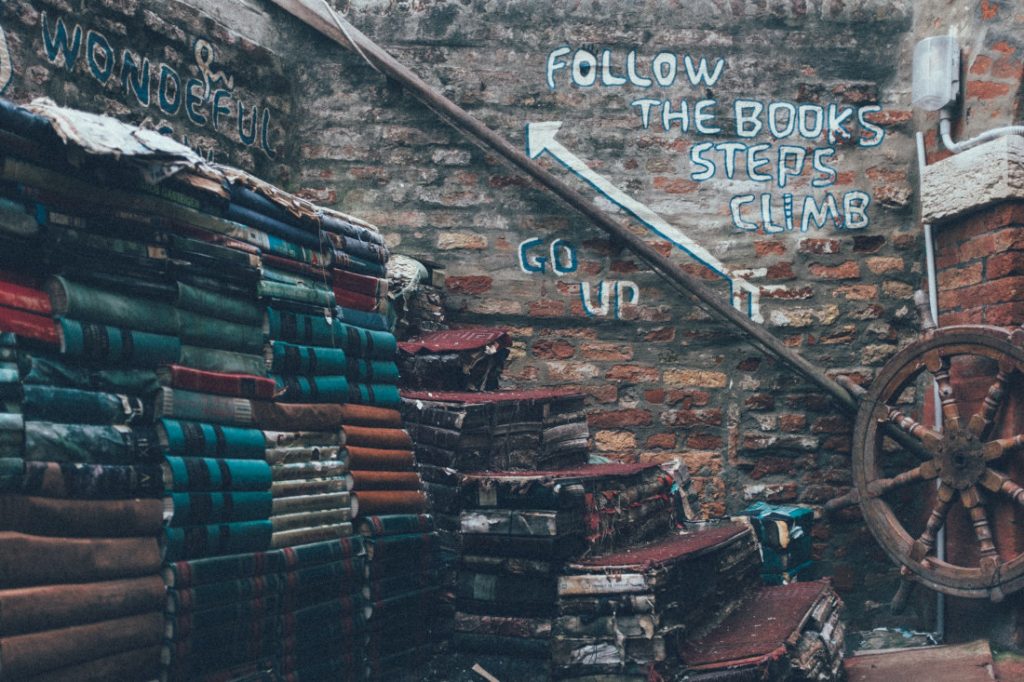
Defining Love by Thomas Jay Oord
Oord brings together a rich array of philosophy, theology and social science pertaining to love in this academic but accessible book. While I don’t follow Oord’s open theism, I benefited greatly from this overview and synthesis of an essential topic.
Glittering Vices by Rebecca Konyndyk DeYoung
I did an interview series with Rebecca when this book was first released in 2009, and a second reading was well worth the time. This is a rich delve into ‘the seven deadly sins and their remedies’, tracing their theoretical development through history, drawing on pop culture and philosophy, with practical, biblical steps to pursuing a life of virtue.
Renaissance by Os Guinness
When I was asked to speak on the theme of Renaissance recently, I was pleased to find one of my favourite cultural analysts had written a book on the subject. Few can tackle the grand sweep of history and its movements quite like Guinness, and this book is a rousing call for the church to live as it is called to in this chaotic historic moment.
See-Through Marriage by Ryan and Selena Frederick
‘We live in a time when vulnerability is stylish but true transparency is exceedingly rare. Every step you take toward transparency is a step away from the crowd.’ Using a cathedral window as a metaphor of being transparent enough for God’s light to shine through us, the Frederick’s explore the difference between healthy privacy and shame-based secrecy, the lies of isolation and what marital oneness can look like. I first met the Fredericks by being a guest on their popular podcast and have come away from this book moved by their desire to follow God wholeheartedly in everything – including their marriage.
Lifesigns by Henri Nouwen
Starting with the idea that all humans long for intimacy, fruitfulness and joy, Nouwen explores how these are either stifled by fear or experienced through divine love. Nouwen wrote this during his early experience with the L’Arch movement, living and working with people with intellectual disabilities, and the result is a beautiful meditation on Christ-centred flourishing.
The Wounded Healer by Henri Nouwen
A classic I’ve finally gotten to read, Nouwen’s reflections on the brokenness of the world and longings of the secular soul are still relevant all these decades after he first wrote them.
Hope by David Aikman
This 1995 book by former Time correspondent Aikman surveys the world’s major religions, as well as Marxism, humanism and more, to assess which has the more hopeful outlook, landing on Christian faith as ultimately having the most hope-full promise.
The Contented Soul by Lisa Graham McMinn
Sociologist McMinn looks at what being content entails, drawing out important insights as to how we became so discontent along the way (her chapter on how we went from understanding ourselves first as souls, then selves, then consumers is incredibly helpful). While a little repetitive in places, and while pet topics like environmental stewardship are sometimes left untied to the central theme, this is a highly valuable book.
Fiction and Poetry
Gold From the Stone by Lemn Sissay
A friend of mine once told me, “I’d like to read more poetry, but I’m just not smart enough to get it!” I understand his sentiment as a lot of poetry leaves me clueless too. But poet Lemn Sissay writes with both a richness and an accessibility I appreciate and this collection, centred on his experience as a black man in Britain relinquished by his foster carers as a boy and now celebrated as an artist, is a good taster of his work.
The Eye by Vladimir Nabokov
A man dies after an altercation with the husband of the woman he’s having an affair with. Or does he? Whether alive or dead, the man then seeks to find out what others thought of someone named Smurov, whom we ultimately discover is himself. A clever though dark tale about identity, objectivity and subjectivity.
The Princess and the Goblin by George MacDonald (free download)
I often read serious books. To balance that up, I turn to imaginative fiction writers like MacDonald, who can’t help but weave moral and spiritual values into his stories too. A cute tale.
The Wise Woman by George MacDonald (free download)
My favourite MacDonald story to date, sometimes titled A Double Story or The Lost Princess, the divine ‘wise woman’ here becomes a moving portrait of the God who loves ugly creatures back to beautifulness.
A Good Man is Hard to Find (and other stories) by Flannery O’Connor
Touted as one of the greatest American short story collections, this book of tales from O’Connor is as vivid as it is dark. A Catholic writing in the Protestant southern states of the US, religious themes are common, but this is no ‘Christian fiction’. Raw, gritty and compelling, with brilliant characterisation, it’s probably satisfied my curiosity about O’Connor for the time being.
Didn’t Finish
Fantastes by George MacDonald (second reading)
I came back for a second helping of this famed first book of MacDonald’s, looking for something imaginative. The imaginative elements are there alright, and you can trace much of CS Lewis’s Narnia magic back to this book. But the insertion of a second narrative two-thirds through was just too much this time. Thankfully, his books got more simple over time!
On the Shelf
The Pleasures of Pessimism by Natasha Moore
I’m looking forward to getting into this short read by Natasha Moore, from Australia’s Centre for Public Christianity, as she explores why pessimism is so popular right now, what it’s perils are, and what it might point us to. This is one book in the Re:considering series of short, sharp takes on contemporary issues from CPX and Acorn Press.
The Cost of Compassion by Tim Costello
Another in CPX’s Re:considering series, if anyone is qualified to write on the need for, costs of, and ways to offer compassion, it’s long-time minister, humanitarian and World Vision campaigner Tim Costello.
More
Sheridan’s new gift book, Reflect with Sheridan
What was the best book you read this year? Tell me in the comments


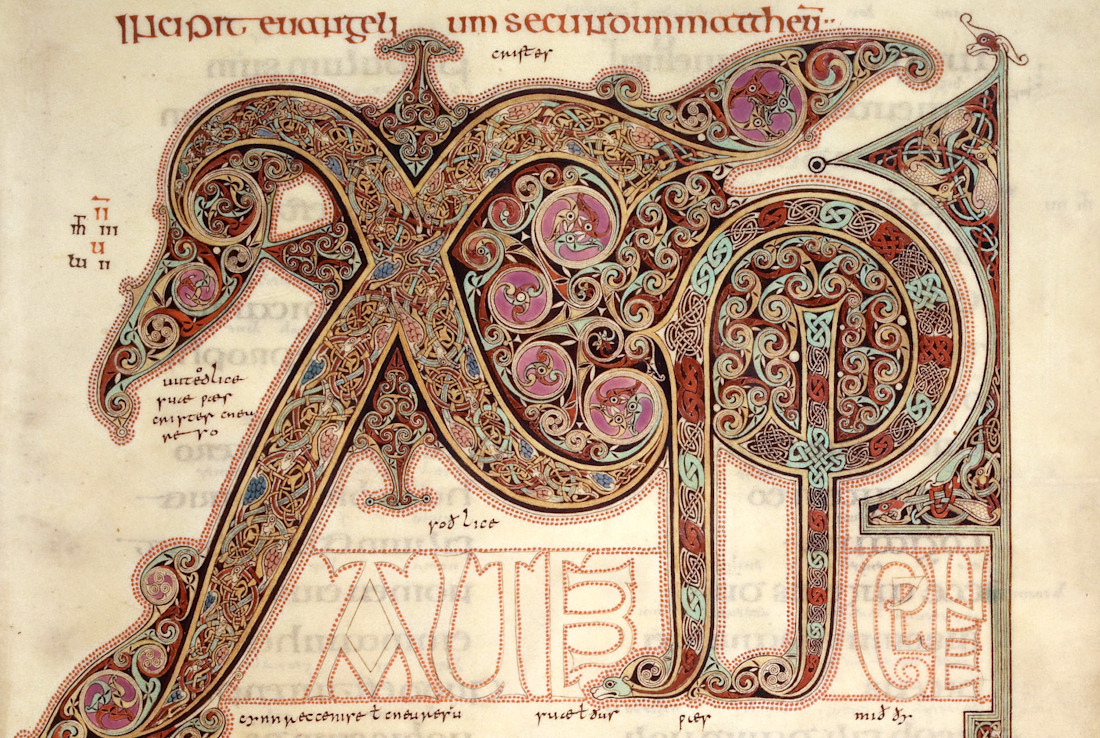
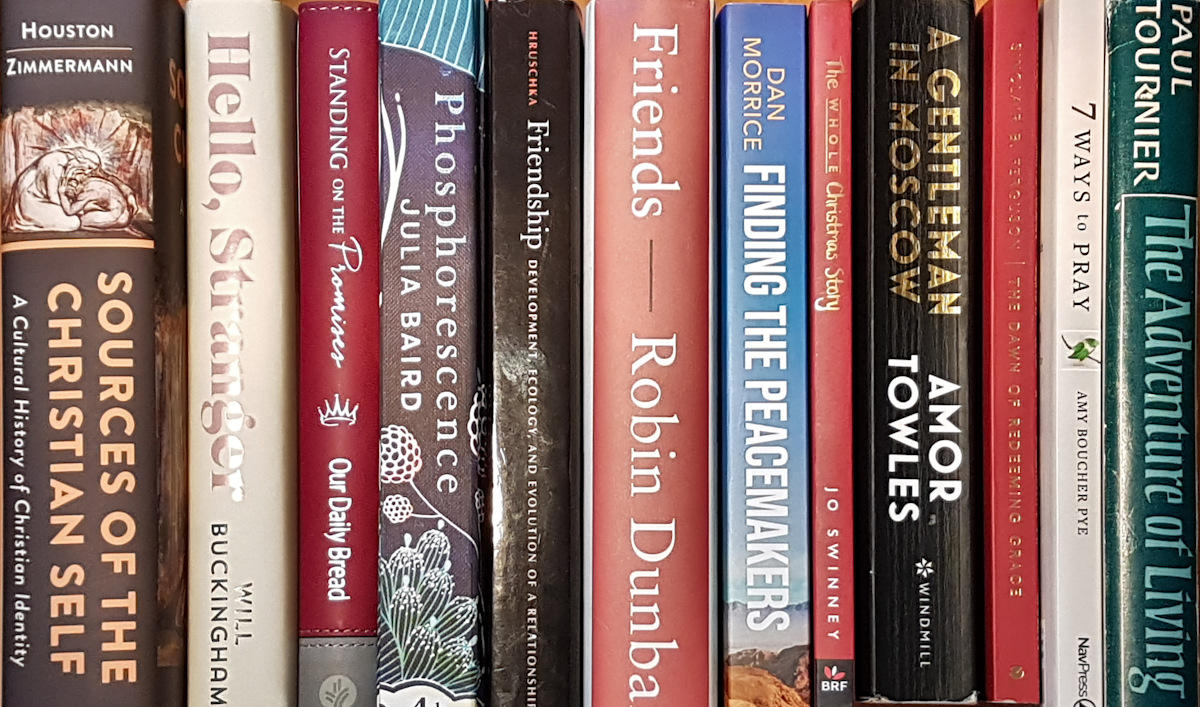
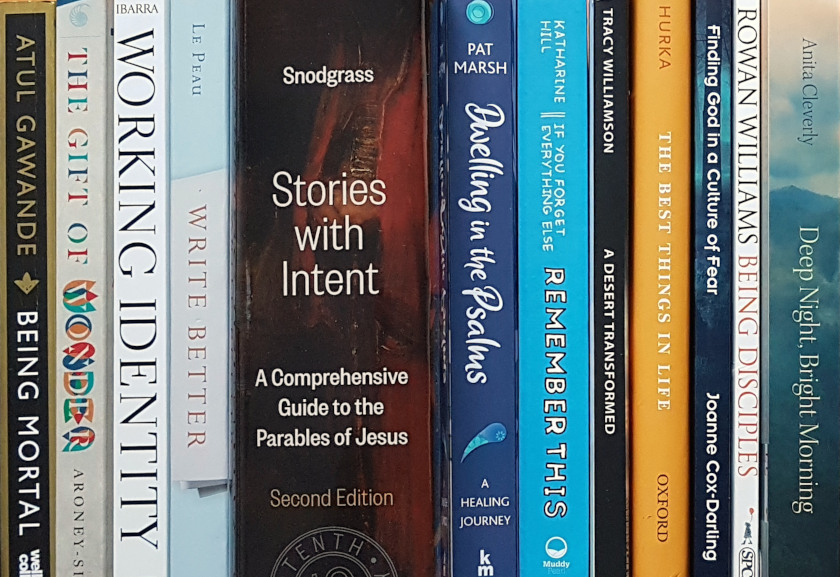
Miranda Worsley
‘Piranesi’ was a stunningly beautiful book after a nineteen year gap
Also there was a very very encouraging article in ‘The Lancet ‘
Sheridan Voysey
I just looked up Piranesi and have added it to my list. Thanks for the tip.
Oh yes, The Lancet paper: https://t.co/cxhtI1EfEv?amp=1 I’m very impressed you read it!
Mari Howard
Oh my – quite a few classic Christian writers there – I’ve been doing a different thing , which I suspect is also useful for serious Christians todo – reading books which are currently popular (eg Sally Rooney’s 2 novels, Conversations with Friends and Normal People) These two give a good and a sad picture of today’s Millennials, living life with no clear ‘moral map’ and struggling… perhaps because I don’t ‘work with’ them, I found these useful and interesting. I also read quite a few by writers from other cultures – Muslim Leila Aboulela is a delightful writer and gives insights into Islam when it is not by any means radicalised or aggressive, but deeply thoughtful and spiritual, as practised gentle and sensitive protagonists. My all-over favourite was though Barbara Kingsolver’s ‘Flight Behaviour’, centred on the migrations of butterflies from Mexico who turn up in Texas among a rural community of religious and climate-change-denying farmers. Her portrait of a young family in this community, where the Mum in her early twenties is thoroughly converted to the scientific viewpoint about the butterflies is delightful (and doesn’t deny the faith broadening her mind to believing the world is threatened by climate change).
Sheridan Voysey
What a great couple of recommendations. I found the writing in Kingsolver’s Poisonwood Bible astonishing. Very interested in Flight Behaviour, and those three other titles. Thanks for the tips.
Merri
The Dictionary of Lost Words, a novel based on the history of the Oxford English Dictionary, compiled by white, middle class Victorian era men. I loved its Oxford setting. Based on true events and real people. Debut novel by Australian author Pip Williams. I look forward to seeing what she has in store for readers.
Sheridan Voysey
I think I’ve seen it. Thanks for the recomendation.
Jean Shepherd
Don’t waste your life – by John Piper – John Piper’s teaching on Christian Hedonism – strapline – God is most glorified in us when we are most satisified in Him. The writer explains it better than I could-
https://www.youtube.com/watch?v=AoKE0RtfNmE
I was already experiencing this on one level but now I have words to articulate it , scriptures to point others to & a deeper understanding/ experience myself.
Sheridan Voysey
Two classic books there. Thanks for the comment, Jean!
Mary Wolfgang
My favorite book this year is Lessons From Saint Francis by John Michael Talbot. Before reading this book, I only knew the bare minimum about Francis: he cared for animals and he took a vow of poverty. There is so much to know and admire as a follower of Christ.
Sheridan Voysey
I must read more on St Frank too. Thanks for the tip!
Kenn Kilah
Hi Sheridan. This year I read two of your books for the first time. I really appreciated ‘The making of Us’. It made me want to go to Scotland and do the same pilgrimage. Resurrection Year was an inspirational lift as we were transported into your pain and the ultimate answer
Blessings
Sheridan Voysey
That brings me so much cheer to read, Kenn. Thank for giving my books your time and attention!
Lisa Cherrett
I’ve read and enjoyed ‘The Princess and the Goblin’ but, like you, I did struggle with ‘Fantastes’. I finished it but couldn’t imagine how it helped Lewis on his journey towards Christianity I enjoyed MacDonald’s ‘Lilith’ slightly more, but it’s still pretty weird.
Completely different – favourite non-fiction of the year was Michel Pastoureau’s ‘History of a Colour: Yellow ‘, the latest in a series that covers black, blue, green and red. They’re all a great mixture of art/cultural/social/religious history.
Sheridan Voysey
What a fascinating topic, yellow. I hope you get to try The Wise Woman out. I think you’d like it as one of MacDonald’s more down-to-earth works.